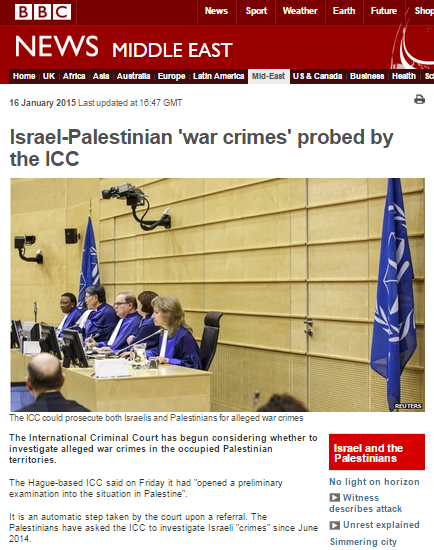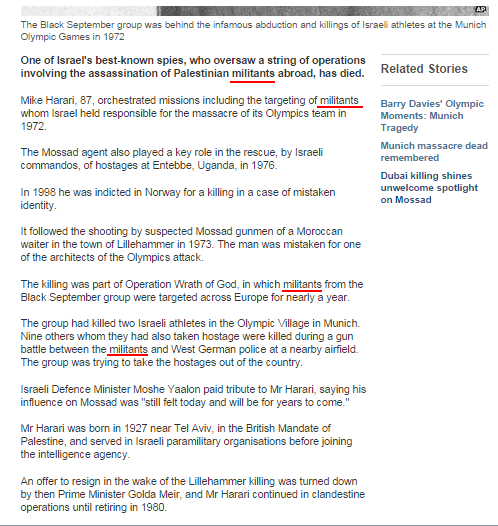An article which appeared on the BBC News website’s Middle East page on January 16th under the title “Israel-Palestinian ‘war crimes’ probed by the ICC” has two commendable features.
First is the fact that the article avoids falling into the sensationalist trap seen in a previous BBC report from May 2013 in which a routine ICC preliminary examination was misleadingly over-dramatised. In this latest report it is made adequately clear to audiences that the process is a routine step required in the case of any referral.
“The Hague-based ICC said on Friday it had “opened a preliminary examination into the situation in Palestine”.
It is an automatic step taken by the court upon a referral.”
And later on in the report:
“In a statement, the ICC says: “A preliminary examination is not an investigation but a process of examining the information available in order to reach a fully informed determination on whether there is a reasonable basis to proceed with an investigation.” “
Secondly, whilst previously published material on this topic failed to point out to BBC the significance of the ‘start date’ selected by the Palestinian Authority (as recently noted in this post) this article does clarify that point.
“Palestinian President Mahmoud Abbas has asked the court to investigate Israeli “crimes… committed in the occupied Palestinian territory, including East Jerusalem, since June 13, 2014”.
This covers events prior to and during last summer’s conflict. The period includes the kidnapping and murder by Jewish extremists of 16-year-old Palestinian Mohammed Abu Khdair on 2 July, one of the events which fuelled an escalation of violence which led to the outbreak of the summer conflict.
The Palestinians’ starting point begins a day after the kidnapping of three Israeli teenagers, who were subsequently murdered, by Hamas militants in the West Bank on 12 June. Mohammed Abu Khdair’s killers said they murdered the teenager in revenge for the murders of the three Israelis.”
On the less bright side however, this latest report continues the practice of promoting out of date information on the subject of the civilian/combatant casualty ratio in the Gaza Strip during July and August 2014 which may well be inaccurate and has not been independently verified by the BBC.
The most notable point about this article, however, is that it totally avoids the most newsworthy aspect of the story it purports to present.
In this report readers are informed that:
“The Palestinians will formally join the ICC on 1 April – 90 days after they submitted documents requesting membership.”
The BBC’s previously published Q&A article on the topic of the Palestinian bid also told readers that:
“The UN Secretary General Ban Ki-moon has said the Palestinians will formally join the ICC on 1 April.”
Some readers may therefore be asking themselves whether or not the fact that the ICC chief prosecutor has already announced a preliminary examination even before the Palestinians formally join the ICC means that she has determined that they are in fact eligible to join that body in accordance with the requirement for its members to be states.
The answer to that question is not provided in the BBC’s report but it does appear in the press release announcing the preliminary examination which was put out by the ICC on January 16th. Whilst the BBC article provides a link to that press release, it does not point out to readers that it includes an explanation of how Fatou Bensouda arrived at the conclusion that she could begin the process of examination.
“On 29 November 2012, the UN General Assembly (UNGA) adopted Resolution 67/19 granting Palestine “non-member observer State” status in the UN with a majority of 138 votes in favour, 9 votes against and 41 abstentions. The Office examined the legal implications of this development for its own purposes and concluded, on the basis of its previous extensive analysis of and consultations on the issues, that, while the change in status did not retroactively validate the previously invalid 2009 declaration lodged without the necessary standing, Palestine would be able to accept the jurisdiction of the Court from 29 November 2012 onward, pursuant to articles 12 and 125 of the Rome Statute. The Rome Statute is open to accession by “all States,” with the UNSG acting as depositary of instruments of accession.”
The significance of that decision is explained by Professor Eugene Kontorovich in an article well worth reading in full.
“The decision to open the inquiry involved the prosecutor determining that the Palestinian Authority is in fact a “state,” a necessary precondition to jurisdiction under the Rome Statute, the Court’s constitutive treaty.
The ICC has never accepted jurisdiction over what is clearly at most a “marginal” state – one that is not a U.N. member, that has not ever claimed to govern any territory, and whose recognition by other states is limited (for example, the U.S., Canada and most Western European states do not recognize the existence of a Palestinian state). This is clearly dramatically different from anything the Court has done before.
But the prosecutor did not actually determine the Palestine qualifies as a “state” under the well-established legal definitions of the term. Rather, she said that the U.N. General Assembly’s vote in 2012 to call Palestine a “non-member state” is dispositive of the question. In short, she substituted the determination of the General Assembly for her own. The GA is not a judicial body, but a political one. Its determinations are political, not legal. (It also has no power under the U.N. Charter, to create or recognize states.)”
In its January 14th Q&A article, the BBC asked “What are the possible implications for the ICC?” and responded to its own question by noting that:
“Some legal commentators suggest that it would open itself up to charges of politicization and set itself up for another damaging failure.”
Given that observation, one would have thought that the BBC would have bothered to inform audiences of the important fact that the opening of this preliminary investigation is based on a decision made in 2012 by a controversial political organisation rather than by a judicial body.




